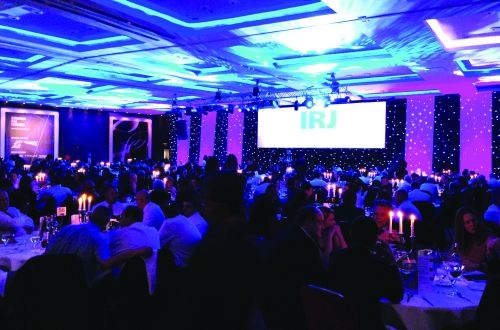The awards are part of a two-day European rail congress, for which IRJ is the official media partner. The award panel for the 20 categories was chaired by Mr Brian Simpson MEP, chairman of the European Parliament's Transport and Tourism Committee, and included Mr Siim Kallas vice-president of the European Commission and European transport commissioner.
Excellence in technology award went to Bombardier for its Flexx Tronic Wako active mechatronic tilting/roll compensation system, developed in cooperation with Liebherr, which tilts the car body by 1.5o to allow double-deck trains in particular to run up to 15% faster through curves, resulting in a journey time reduction of up to 10%.
Excellence in engineering award was won by Sacyr, Spain, for its new shaft construction method which minimises disruption to traffic and pedestrian zones at Unesco heritage sites and allowed construction times to be reduced by half.
Excellence in environmental sustainability award went to Austrian Federal Railways' (OBB) railway power zero emission system which allows Vienna's City Airport Train to run on a CO2-free traction power system generated from 100% renewable energy.
Excellence in marketing award went to French National Railways (SNCF) for its Selling the Dream marketing and ticketing initiative.
Excellence in safety and security award was won by the German Aerospace Centre for its railway collision avoidance system (RCAS) which combines a train-to-train communication system, a location system and a situation analysis and decision support system using only on-board equipment thereby eliminating the need for expensive trackside equipment.
Most innovative rail project of the year went to Heatpoint, Netherlands, for its Isoblock points insulation product which enables rails to retain sufficient heat to melt snow while requiring 50% less energy to do so.
Best partnership of the year award was won by German Rail (DB) for its moving ideas campaign to enable the entire transport and logistics industry to collaborate on joint innovations.
Best integration award went to Belgian infrastructure manager Infrabel for its €678m Diablo rail link serving Brussels airport.
Customer service and information excellence award was given to the British Northern Rail Community Ambassadors scheme to promote the use of local rail services with black and minority ethnic and socially excluded groups.
Station of the year awards went to North Hessen Transport Association (NVV) for Eschwege, a small station, Munich Transport (MVG) for four medium-size underground stations, and Italian Rail Network (RFI) for the reconstruction of Turin Porta Susa.
European freight operator of the year award went to ERS Railways, a private company operating in four countries, while the freight facility of the year award was presented to Hungarian State Railways (MÁV).
European commuter operator of the year went to London Overground Rail Operations which achieved a 25% growth in passengers last year.
European metro operator of the year award was presented to London Underground which continues to achieve record-breaking passenger numbers in the midst of a huge upgrade programme and the 2012 Olympics which saw a 35% increase in passengers.
European light rail operator of the year award was given to OHL Concesiones for its Metro Ligero Oeste concession for two LRT lines which operate with 99% punctuality.
European cross-border operator of the year went to Thello, a subsidiary of Trentitalia and Transdev, for its two night trains between France and Italy. The Paris – Venice service carried more than 300,000 passengers in its first year, 20% more than forecast.
European regional operator of the year award was made to SNCF for its Mulhouse tram-train. European inter-city operator of the year award was given to First TransPennine Express, Briatin, which has seen 85% passenger growth since 2004.

